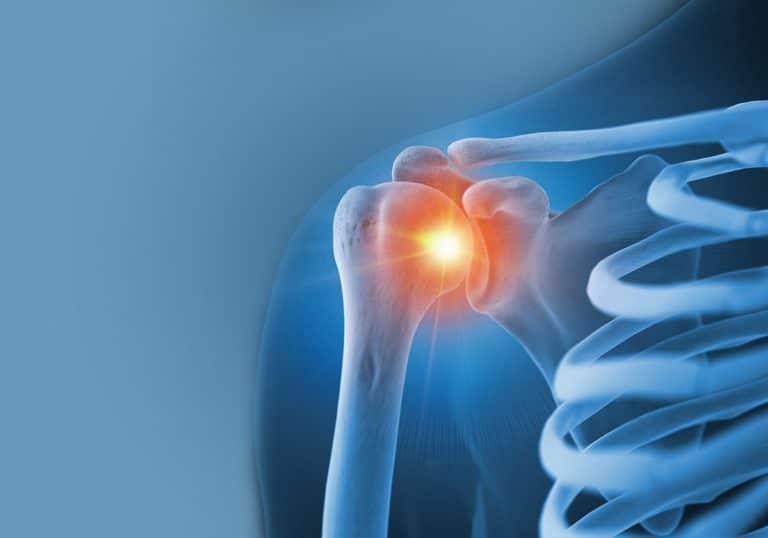
Total Joint Shoulder Surgery Recovery
This content was updated for accuracy and relevance on 02/13/2024.
The shoulder is a highly mobile joint and often one of the first joints in the human body to develop arthritis. The shoulder joint is a ball and socket joint between the shoulder blade (scapula) and the upper arm bone (humerus). Other important bones in the shoulder include the “roof” of the shoulder joint, which is made up of the acromion (a bony projection off the shoulder blade) and the collar bone (clavicle).
A total shoulder replacement is the 3rd most common joint replacement and is a highly successful procedure. Another name for the Total Shoulder Replacement is Total Shoulder Arthroplasty (TSA). This procedure, along with physical therapy, allows individuals to return to their previous level of functioning with significant pain relief. Discover more about shoulder replacement recovery time and what’s needed for a successful recovery.
How do I know if I need a shoulder replacement?
A shoulder replacement is usually indicated if a person is experiencing signs and symptoms consistent with shoulder arthritis such as:
- Shoulder pain
- Crepitus (crunching sounds)
- Shoulder movement difficulty
Initially, most doctors will try to treat this conservatively with cortisone and anti-inflammatories, but when these stop working- it is most likely a sign that joint replacement surgery is needed.
Are there different types of total shoulder Replacements that can be performed?
There are two common types of shoulder replacement surgery that are routinely performed: the traditional TSA and reverse TSA. With the traditional TSA, the ball of the joint (head of the humerus) is replaced with a metal ball, and the socket is replaced with a smooth plastic cup. With the reverse total shoulder replacement, the ball and socket are switched: a metal ball implant is placed where the patient’s socket was, and a plastic socket is placed where the patient’s humeral head (ball portion of the joint) was.
Each shoulder replacement surgery is reported to be highly successful and the best option for you should be discussed with your orthopedic surgeon.
What is the shoulder surgery recovery time?
The shoulder replacement surgery recovery time varies from person to person, but it generally takes eight weeks or more for patients to regain shoulder strength. Keep in mind though, that it may take several months for patients to return to strenuous exercise levels or heavy labor. It is especially important in the early stages of rehabilitation to listen to the guidance from the physical therapist to avoid any setbacks in the total shoulder replacement recovery process.
A typical shoulder replacement recovery process is as follows:
- 4-6 weeks: Patient is typically in a sling and must also avoid strenuous activity
- 6-8 weeks: Full shoulder movement is typically restored
- 8-12 weeks: Patients begin shoulder strengthening exercises and work toward returning to previous shoulder strength
- 3 months: Basic shoulder function is restored
- 1 year: At times, a full shoulder replacement recovery can take up to 1 year to ensure a safe return to previous lifestyles and hobbies.
See related: Hip Replacement Surgery Recovery: 8 Tips
What is the fastest way to recover from shoulder surgery?
Some shoulder surgery recovery tips include adhering to guidelines and advice from your orthopedic surgeon and physical therapist.
The key components for an optimal total shoulder replacement recovery include:
- Proper pain management
- Keeping activity to defined parameters to avoid increased pain and doing too much, too soon
- Maintaining adequate nutrition and sleep – this allows for optimal healing and minimizing inflammation as your body recovers
How long does shoulder pain last after surgery?
Post surgery pain is well managed by nurses and doctors and typically does not last long. In the 1-3 days following orthopedic surgery, most people will experience pain at the incision site and will be given pain medication at home. Pain can also be managed by cold packs and additional treatment provided by a physical therapist.
Benefits of physical therapy for shoulder surgery
Physical therapy will help you safely and optimally recover from your total shoulder replacement surgery. It ensures a holistic approach to healthcare that will assist the shoulder joint return to optimal functioning and will allow YOU to return to desired activities and hobbies pain-free. Reach out to Ivy Rehab today for more information on rehabilitation physical therapy options.
Article By: Bridgette Sakar, DPT, PT, OCS
Bridgette Sakar began her physical therapy career 7 years ago. Bridgette loves working with the athletic population and believes that an active body is a healthy body. Bridgette is a graduate of the HSS Ivy Rehab Orthopedic Residency Program and is a board-certified Orthopedic Clinical Specialist. She currently specializes in orthopedic and sports injuries. Bridgette currently treats patients at Ivy Rehab Physical Therapy in Denville, NJ.
The medical information contained herein is provided as an information resource only, and does not substitute professional medical advice or consultation with healthcare professionals. This information is not intended to be patient education, does not create any patient-provider relationship, and should not be used as a substitute for professional diagnosis, treatment or medical advice. Please consult with your healthcare provider before making any healthcare decisions or for guidance about a specific medical condition. If you think you have a medical emergency, call your doctor or 911 immediately. IvyRehab Network, Inc. disclaims any and all responsibility, and shall have no liability, for any damages, loss, injury or liability whatsoever suffered as a result of your reliance on the information contained herein.